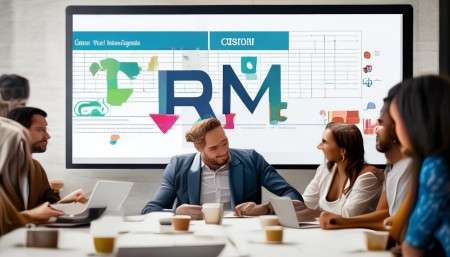
△Click on the top right corner to try Wukong CRM for free
So, you’ve probably heard the term CRM thrown around a lot lately—especially if you’re in sales, marketing, or customer service. I mean, it’s everywhere these days. But honestly, what is CRM? Like, what does that acronym even stand for? Well, let me break it down for you in a way that actually makes sense—no jargon overload, no confusing tech talk. Just real talk.

Free use of CRM system: Free CRM
Alright, so CRM stands for Customer Relationship Management. That’s the full form. Simple enough, right? But don’t let the simplicity of the name fool you. This thing is kind of a big deal in the business world. Think about it: every company wants happy customers, right? And keeping customers happy isn’t just about selling them something once and forgetting about them. It’s about building relationships—long-term ones. That’s exactly what CRM is all about.
Now, here’s where it gets interesting. CRM isn’t just one single tool or software. It’s actually a whole strategy—a mix of practices, technologies, and processes that help businesses manage their interactions with current and potential customers. So, it’s not just about having a fancy database; it’s about using that data to improve how you connect with people.
Let me give you an example. Imagine you run a small online store. A customer buys a pair of shoes from you. Without CRM, that might be the end of the story—you make the sale, they get the shoes, and maybe they never come back. But with CRM, you can track that purchase, send them a follow-up email asking how they like the shoes, recommend matching accessories, and even offer a discount on their next order. See the difference? You’re not just making a one-time sale—you’re nurturing a relationship.
And guess what? Most modern CRM systems are digital platforms. Yeah, there are actual software tools out there—like Salesforce, HubSpot, Zoho—that help companies organize customer info, automate tasks, and analyze behavior. These tools basically act like a central hub for everything related to your customers. Sales calls, emails, support tickets, social media messages—it all gets logged in one place. That way, no matter who on your team talks to a customer, they can see the full history. No more repeating yourself or missing important details.
But here’s the thing—CRM isn’t just for big corporations. Small businesses can benefit from it too. In fact, sometimes smaller teams need it even more because they don’t have huge departments handling different parts of the customer journey. With CRM, a five-person startup can still deliver a personalized experience that feels professional and thoughtful.

Now, since we’re doing a bilingual explanation, let me switch gears a bit and explain this in Chinese as well—because hey, why not? After all, the world’s getting more connected every day, and understanding things in multiple languages just makes sense.

所以,CRM 的全称是“客户关系管理”,英文就是 Customer Relationship Management。这不仅仅是一个缩写,它代表了一种理念和方法。简单来说,就是企业如何更好地与客户打交道,不只是卖东西,而是建立长期的关系。比如,当一个客户买了你的产品,CRM 帮你记住他们的购买历史、偏好,甚至生日。然后你可以发一封个性化的邮件,说:“嘿,我们知道你喜欢这款咖啡,今天我们有特别优惠!” 这样一来,客户会觉得被重视,而不是被当成一个普通的订单号。
现在很多公司用的 CRM 系统,其实就是一个软件平台。它可以记录客户的每一次互动——打电话、发邮件、在线聊天,全都存下来。销售团队、客服团队都能看到完整的信息,避免重复沟通或者遗漏重要细节。而且,这些系统还能自动提醒你什么时候该跟进客户,或者分析哪些产品最受欢迎。这样一来,做生意就变得更聪明、更高效了。
即使是小公司,也可以用 CRM。现在有很多价格合理甚至免费的工具,比如 HubSpot 或者 Zoho CRM,功能很强大,操作也不复杂。你不需要是个技术专家才能上手。关键是,它能帮你把客户信息整理得井井有条,不再靠记在本子上或者靠脑子记。
回到英文这边—so, going back to English—another cool thing about CRM is how it helps with data analysis. I know, data sounds boring, but hear me out. When you collect information about your customers—what they buy, when they buy, how they respond to emails—you start seeing patterns. And those patterns? They’re gold. For example, maybe you notice that customers who buy hiking boots in the spring are more likely to buy backpacks in the summer. With that insight, you can create targeted campaigns that actually work.
And let’s not forget about customer service. A good CRM system can make support teams way more effective. Imagine a customer calls in with a problem. Instead of asking, “Can you tell me your order number?” the agent already sees the entire history on their screen. They can say, “Hi Sarah, I see you bought the blue jacket last week and it hasn’t arrived yet. Let me check that for you.” That kind of personal touch? Huge. It builds trust and loyalty.
Oh, and automation! Can we talk about automation for a sec? CRM tools can automatically send birthday wishes, schedule follow-ups, or even assign leads to the right salesperson based on location or product interest. That means less manual work, fewer mistakes, and more time for your team to focus on actual human conversations.
But—and this is a big but—CRM only works if you use it properly. Having the best software in the world won’t help if your team doesn’t enter data consistently or ignores the insights it provides. It’s like buying a fancy car but never learning how to drive. The tool is powerful, but the people using it make all the difference.
Also, privacy matters. With great data comes great responsibility. Companies need to be careful about how they collect and use customer information. Nobody likes feeling spied on. So transparency is key. Let customers know what data you’re collecting and why. Give them options to opt out. Respect their boundaries. That’s how you build real trust—not just through features, but through ethics.
Another point: CRM isn’t static. It evolves. As customer expectations change, so should your CRM strategy. Ten years ago, email was king. Today, people expect quick responses on WhatsApp, Instagram, or live chat. Modern CRM systems now integrate with these channels, so you can manage conversations across platforms without losing context.
And here’s a fun fact—CRM isn’t just for external customers. Some companies use internal CRM-like systems to manage relationships with employees, partners, or suppliers. Because at the end of the day, relationships matter everywhere. Whether it’s a client or a coworker, communication and organization make things smoother.
So, wrapping this up—CRM stands for Customer Relationship Management, and it’s way more than just an acronym. It’s a mindset. It’s about putting the customer at the center of everything you do. It’s about using technology not to replace human connection, but to enhance it. To remember names, honor preferences, and show that you care.
Whether you’re running a local coffee shop or a global e-commerce brand, CRM can help you grow—not just in sales, but in loyalty and reputation. Because people don’t just buy products; they buy experiences. And a good CRM system helps you deliver better experiences, one interaction at a time.
Now, before I go, let me answer some questions you might be wondering about. I’ve been thinking—what would I ask if I were just learning about CRM?
Q: Is CRM only for big companies?
A: Nope! While large businesses often have complex CRM setups, there are plenty of affordable and even free CRM tools perfect for small businesses or solopreneurs.
Q: Do I need technical skills to use CRM software?
A: Not really. Most modern CRM platforms are designed to be user-friendly. If you can use email or social media, you can probably figure out a CRM interface.

Q: Can CRM help with marketing?
Absolutely. CRM systems let you segment your audience, track campaign performance, and personalize messages—making your marketing way more effective.
Q: What’s the difference between CRM and ERP?
Great question! ERP (Enterprise Resource Planning) focuses on internal operations like inventory, finance, and HR. CRM, on the other hand, is all about customer-facing activities—sales, service, and marketing.
Q: Is cloud-based CRM safe?
Most reputable CRM providers use strong encryption and security measures. As long as you choose a trusted platform and follow best practices (like strong passwords), it’s generally very secure.
Q: Can CRM improve customer retention?
Yes! By tracking interactions and preferences, CRM helps you stay connected with customers, anticipate their needs, and reduce churn.
Q: How do I choose the right CRM for my business?
Start by identifying your goals. Do you need better sales tracking? Improved support? Marketing automation? Then look for a CRM that fits your budget and offers the features you actually need—not just the flashy ones.
Q: Does CRM work for B2B and B2C businesses?
Definitely. Whether you’re selling to other businesses (B2B) or directly to consumers (B2C), managing relationships is crucial. CRM adapts to both models.
Q: Can I integrate CRM with other tools I use?
Most CRM platforms offer integrations with email, calendars, social media, e-commerce sites, and more. Check the app marketplace of your chosen CRM to see what’s available.
Q: Will CRM replace human interaction?
Not at all. A good CRM enhances human interaction by giving you better information and freeing up time from repetitive tasks—so you can focus on meaningful conversations.
Alright, that’s it. I hope this made CRM feel a little less mysterious and a lot more practical. It’s not magic—it’s just smart, organized, and customer-focused thinking, powered by helpful tools. And honestly, in today’s world, that’s kind of magical on its own.
Related links:
Free trial of CRM
Understand CRM software

△Click on the top right corner to try Wukong CRM for free